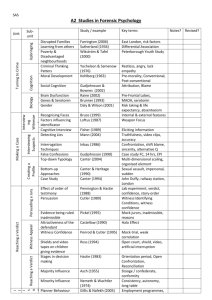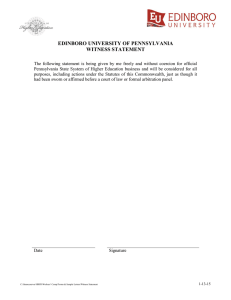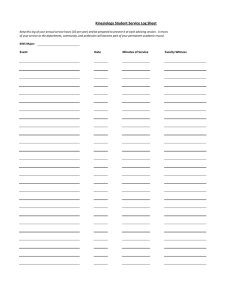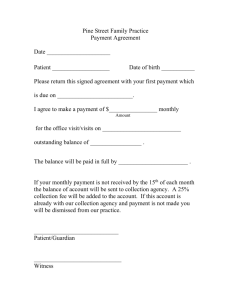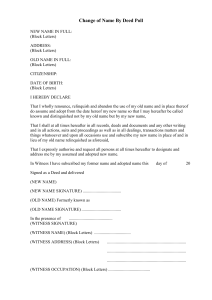Document 12820344
advertisement
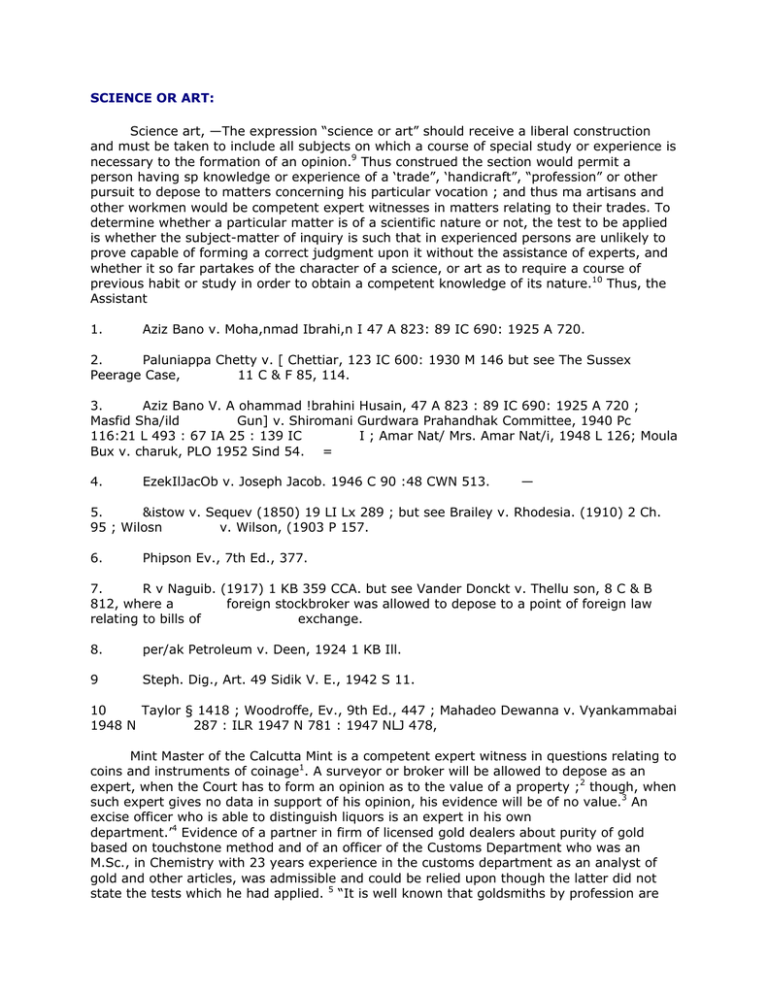
SCIENCE OR ART: Science art, —The expression “science or art” should receive a liberal construction and must be taken to include all subjects on which a course of special study or experience is necessary to the formation of an opinion.9 Thus construed the section would permit a person having sp knowledge or experience of a ‘trade”, ‘handicraft”, “profession” or other pursuit to depose to matters concerning his particular vocation ; and thus ma artisans and other workmen would be competent expert witnesses in matters relating to their trades. To determine whether a particular matter is of a scientific nature or not, the test to be applied is whether the subject-matter of inquiry is such that in experienced persons are unlikely to prove capable of forming a correct judgment upon it without the assistance of experts, and whether it so far partakes of the character of a science, or art as to require a course of previous habit or study in order to obtain a competent knowledge of its nature.10 Thus, the Assistant 1. Aziz Bano v. Moha,nmad Ibrahi,n I 47 A 823: 89 IC 690: 1925 A 720. 2. Paluniappa Chetty v. [ Chettiar, 123 IC 600: 1930 M 146 but see The Sussex Peerage Case, 11 C & F 85, 114. 3. Aziz Bano V. A ohammad !brahini Husain, 47 A 823 : 89 IC 690: 1925 A 720 ; Masfid Sha/ild Gun] v. Shiromani Gurdwara Prahandhak Committee, 1940 Pc 116:21 L 493 : 67 IA 25 : 139 IC I ; Amar Nat/ Mrs. Amar Nat/i, 1948 L 126; Moula Bux v. charuk, PLO 1952 Sind 54. = 4. EzekIlJacOb v. Joseph Jacob. 1946 C 90 :48 CWN 513. — 5. &istow v. Sequev (1850) 19 LI Lx 289 ; but see Brailey v. Rhodesia. (1910) 2 Ch. 95 ; Wilosn v. Wilson, (1903 P 157. 6. Phipson Ev., 7th Ed., 377. 7. R v Naguib. (1917) 1 KB 359 CCA. but see Vander Donckt v. Thellu son, 8 C & B 812, where a foreign stockbroker was allowed to depose to a point of foreign law relating to bills of exchange. 8. per/ak Petroleum v. Deen, 1924 1 KB Ill. 9 Steph. Dig., Art. 49 Sidik V. E., 1942 S 11. 10 Taylor § 1418 ; Woodroffe, Ev., 9th Ed., 447 ; Mahadeo Dewanna v. Vyankammabai 1948 N 287 : ILR 1947 N 781 : 1947 NLJ 478, Mint Master of the Calcutta Mint is a competent expert witness in questions relating to coins and instruments of coinage1. A surveyor or broker will be allowed to depose as an expert, when the Court has to form an opinion as to the value of a property ;2 though, when such expert gives no data in support of his opinion, his evidence will be of no value.3 An excise officer who is able to distinguish liquors is an expert in his own department.’4 Evidence of a partner in firm of licensed gold dealers about purity of gold based on touchstone method and of an officer of the Customs Department who was an M.Sc., in Chemistry with 23 years experience in the customs department as an analyst of gold and other articles, was admissible and could be relied upon though the latter did not state the tests which he had applied. 5 “It is well known that goldsmiths by profession are able to find out whether a piece of metal is gold or not by the colour of the streak produced by rubbing it on a touchstone used by them even though their assessment of its purity may not be exact. It way not be a scientific way of proving that the metalled bars were gold bars.” But the Supreme Court did not rule out the goldsmiths evidence as inadmissible.6 - In cases arising out of the infringement of copyright, the Court, in ordinary circumstances, would get the opinion of experts by appointing them Commissioners to investigate and report on the matters in issue ;7 but it is not permissible in such cases to admit as evidence the opinion of literary gentlemen that the defendant copied from the plaintiff, as it is not a matter for expert testimony at all. 8 If the subject-matter of the inquiry does not require any special study or experience, opinion evidence will be inadmissible.9 Thus, the opinion of a businessman that goods bearing certain trade marks alleged to be imitations are likely to deceive the purchasers does not amount to expert opinion on any question of science or art, 10and is therefore inadmissible. A haulage contractor who owns several lorries and has been in business for 16 years, and also fits a large quantity of tyres every month for other companies, is an expert on the quality, wear and usage of tyres11 . Gambling cannot be considered •to be either ad art or a science so as to entitle a Police Officer to go into the witness-box and speak as an expert that in his view, based on experience in other cases, certain documents are instruments of gaming. Such opinion may, however, become relevant under Section 49,12 Generally speaking it is not permissible to call a witness to explain to the Court what a document means unless the witness is an expert,13 or the document contains. 1. Gil EL, 88 IC 818 : 19250616:26 Cr Li 1232. 2. Secretary of State v. Sarla Devi Chaudhrani, 5 L 227 : 79 IC 74 : 1924 L 548 ; Government of Bombay v. Karim Tar Ma/iomed, 33 B 325 3 IC 273. 3. Pribhu Diya/ v. Secretary of State, 135 IC 183 : 1931 I 36! ; Secretary of State v. Sarla Devi Chaudhrani, 5 L 227 : 79 IC 74 : 1924 L 548. 4. Ram Karan Sing v. E. 154 IC 341 :1935 N 13:36 Cr Li 511. 5. M. G. Venugopalan v. B V Govindan, 1976 Cr U 165 (Para 4). 6. .Asst. Collector v. V. P. Sayed Mohamed. 1983 SC 168 (Para 4). 7. Sita Nath Basak v. Mo Mo/ian Sing/i, 81 IC 754 1924 C 595. 8. Deeks v. We/Is, 142 JC 815 1933 PC 26. 9 I Born. HCR 148. 10 Macdonald & Co, v. [ & Moss, 4 (IC 539. 11. Globe Automobile Co. v, K. A. K. Master, (1935) 157 IC 12. 12. E. v. Harila/ Gord/jan, ILR 1937 B 670 : 1917 I 385 171 IC 282 : 38 Cr Li 1047. 13. E. v. Nat Vanmali, 41 Born. LR 518. words or terms used in particular districts or by particular classes of people and the Witness has special means of knowledge of them. 1 Telephone is a science or art and the witnesses’ knowledge of the telephone and of engineering generally places them in a special position and makes them competent to express an opinion upon articles and matters which are largely in use in the department of the telephone and of engineering generally”.2 Mode of making expert opinion evidence.—Under this section, an expert has to state his opinion in Court and must be examined and cross-examined like any other witness. While giving evidence, the expert may refer to any professional treatise or any memorandum which he may have prepared at a time when the facts on which his opinion is based were fresh in his memory,3 though the memorandum itself is not evidence and no facts can be taken from it.’4 If the expert whose opinion is intended to be proved is dead or cannot be produced without an unreasonable amount of delay or expense, his opinion may be proved by the production of any treatise commonly offered for sale.5 The Court itself may, on all matters of science or art, resort for its aid to appropriate books or documents of reference, and well-known scientific works may be read during trial as evidence of experts.6 An expert may be examined on commission under Chap. XL of the Criminal Procedure Code, or Order XXVI of the Civil Procedure Code ; and under 0. XXXIX, r. 7 of the latter Code, the Court may authorize an expert to take samples or to make any observation or experiments for the detention, preservation or inspection of any property which is the subject-matter of the suit. The Court may, for its own guidance and information, order independent inquiries and reports to be made, or experiments to be tried by experts of its own selection.7 The deposition of a medical expert taken and attested by a Magistrate in the presence of the accused or taken on commission, and the report of a Chemical Examiner may be treated as evidence without calling the medical expert or the Chemical Examiner as a witness.8 Apart front these special statutory provisions, however, a report, certificate or letter of an expert cannot be considered as evidence, if its author 1. Section 49. 2. Bachraj Factories, Ltd. v. Bambay Telephone Co. Ltd., 1930 S 245. 3. Section 159. 4. Roghuni Singh v. E., 9.C 455. 5. Section 60 ; as to the mode of using a text book, see Grandé Venkata Ratnam v. Corporation of Calcutta 46 IC 593 : 19 Cr LI 753. 6. Section 57 ; Hurry Churn Chuckerbutty v. E., 10 C 140. In the matter of the Steamship “Drachenfels”, 27 C 860 the Court referred to the Imperial Gazetteer and a well-known work on Topography, and in Martand Rao v. tvfalhar Rao, 55 C 403 : 55 IA 45: 107 IC 7:1928 PC 10, the Privy Council referred to official reports regarding some historical matters. 7 Marconi v. British Co., Times Dec, 15 1910, cited in Phipson Lv., 7th Ed., 314 ; see Sita Nath Basak v. Mohini Mo Sing 81 IC 754 1924 C 595, where it has been remarked that in infringement of copy right cases experts should be appointed Commissioners. 8. Sections 509 & 510, Cr P Code, but see i Bibi v. E., 15 L ‘310:152 IC 206:1934 L150:36 Cr LJ ;Happuv.E., 1461C 1089: 1933 A 837 35 Cr U 280 ; Tulsiratn Kanu v. State, 1954 Sc 1: 1953 SCJ 612 1954 Cr LJ 225. has not been produced in Court to prove it.1 But if a party has accepted the report of an expert as evidence without the expert being examined in Court, he cannot object to the admissibility of the report in appeal.2 Where the lower Court has based its decision on the opinion of an expert contained iii a report, though he has not given sworn testimony in support of the report, the objection to such evidence will not he permitted to be taken for the first time in revision.3 Expert should be examined in the presence of the accused and not on commission —It is not satisfactory to examine an expert on commission in criminal cases. The evidence of an expert has always to he carefully weighed and much more so when the expert has been examined on commission and not in the presence of the accused. The value of expert evidence, when given on commission, is considerably reduced.4
